Have Your Say: What does Milan Design Week need to deliver in order to lead the international design event scene?
At Design Insider we recognise the expertise within commercial interiors and we are proud to instigate conversations which inform, challenge & inspire the people who make our sector thrive.
From the 18th to the 20th April our Editor, Alys Bryan, will be visiting Milan Design week and immediately following the event will publish a Trend Report sponsored by Inside Out Contracts.
Maria Porro, Salone del Mobile president, has stated that this years’ fair aims to ensure that the fair is not “stagnant and living on its past success” following the covid disruption. When speaking with Dezeen she explained that: “Salone is not standing still: the new challenges lie in fleshing out a vision of the furnishing system that, of necessity, is more ethical and aware – design that besides being functional and good-looking is also capable of engendering conditions and spaces for wellness, refuge and inclusion.”
Many believe that this event is at the pinnacle of the design scene, but is it? Can it deliver it’s promise of “a new trade-fair experience, an impactful cultural program, [and] an event that focuses on sustainability” and maintain it’s international standing amongst persistent competition?
Therefore, before we jet off we wanted to ask: What does Milan Design Week need to deliver in order to lead the international design event scene?
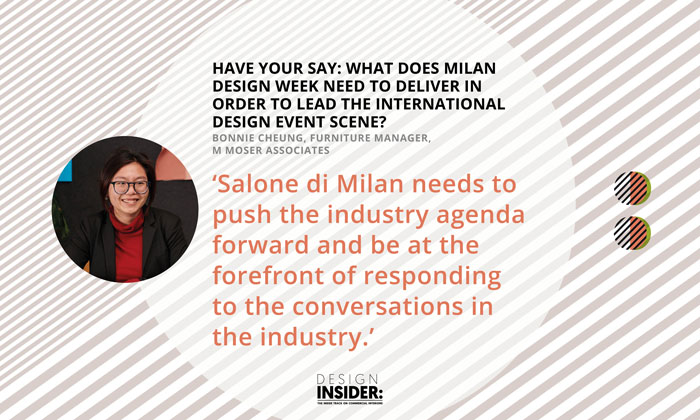
‘To lead the international design event scene, Salone di Milan needs to push the industry agenda forward and be at the forefront of responding to the conversations in the industry. As well as showcasing the latest in furniture and lighting, it needs to continue to drive innovation and bring people together to explore what goes into manufacturing these products and their impact on helping achieve more sustainable environments. The event must spearhead how we can make impactful changes in our industry and be globally future-focused.’
Bonnie Cheung, Furniture Manager, M Moser Associates
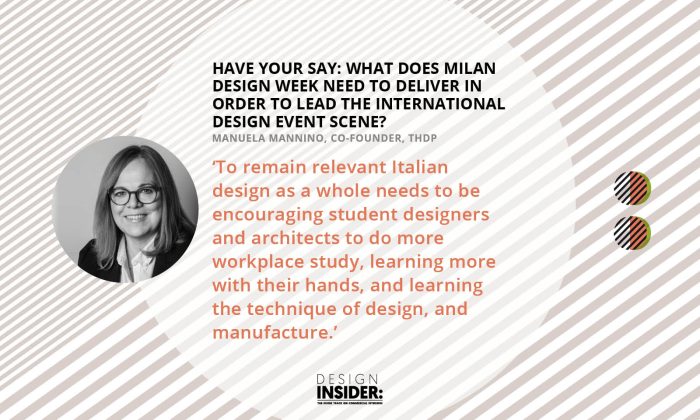
‘To remain relevant Italian design as a whole needs to be encouraging student designers and architects to do more workplace study, learning more with their hands, and learning the technique of design, and manufacture. Many large Italian companies were founded by artisans and craftsmen, and many are still family companies – but too many are now owned by central cooperate companies whose desire removes the inherent need for amazing, unique and irreverent Italian design – replacing it with forms and designs that are too familiar and repetitive.’
Manuela Mannino, Co-Founder, THDP
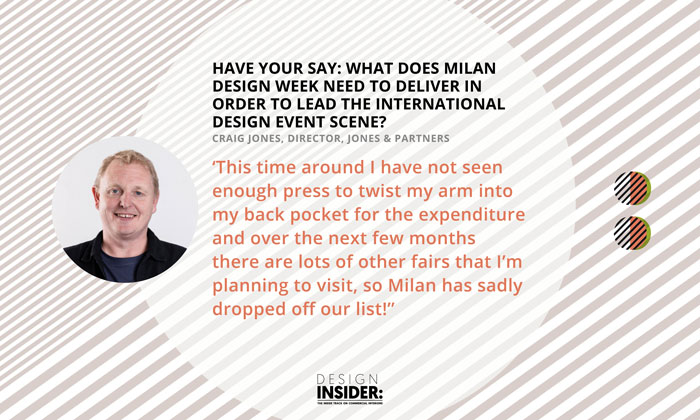
‘I normally visit the Milan fair every few years. The last time was pre-covid and that year I found myself wandering through the streets of Milan looking for pockets of insight, which the event unfortunately failed to deliver but which did require considerable time, long walks and multiple train journeys. I find the fair a little too board, making it hard to find focus and space to evaluate product types or market sectors. This is not a massive deal breaker, but as a professional in this industry it is, this is the only fair you need to pay for. This time around I have not seen enough press to twist my arm into my back pocket for the expenditure and over the next few months there are lots of other fairs that I’m planning to visit, so Milan has sadly dropped off our list!’
Craig Jones, Director, Jones & Partners
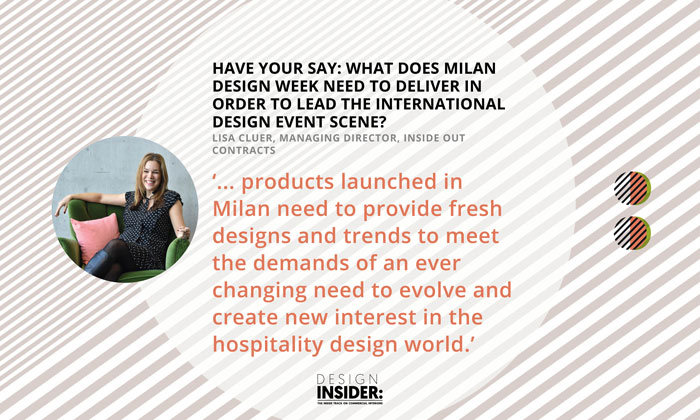
‘To lead international design the products launched in Milan need to provide fresh designs and trends to meet the demands of an ever changing need to evolve and create new interest in the hospitality design world. The growing need for sustainability, whilst maintaining a strong sense of style, requires suppliers to think carefully and creatively through the use and production of innovative recycled materials.’
Lisa Cluer, Managing Director, Inside Out Contracts
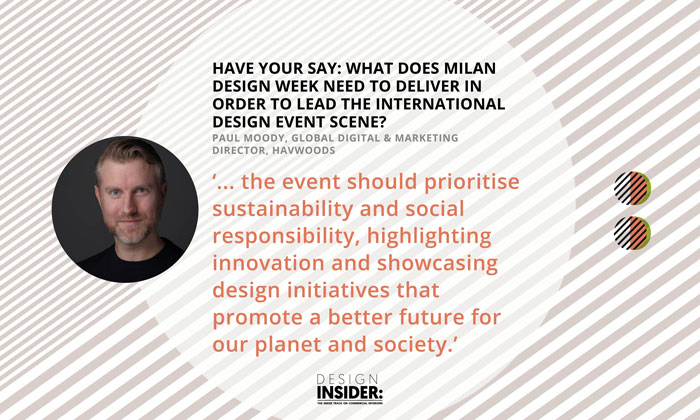
‘Milan Design Week needs to continue to evolve and offer an unparalleled experience that showcases the latest trends and advancements in the design world. It must unite a diverse range of designers, suppliers, and leading industry professionals from around the world, creating an inclusive environment that fosters collaboration and inspiration. To me personally, the event should prioritise sustainability and social responsibility, highlighting innovation and showcasing design initiatives that promote a better future for our planet and society.’
Paul Moody, Global Digital and Marketing Director, Havwoods
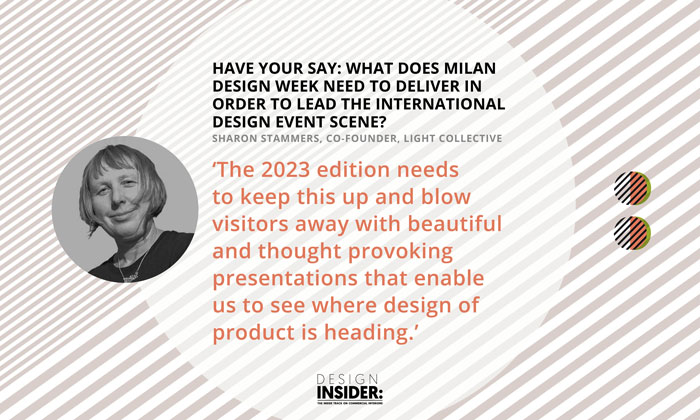
‘Milan Design Week has always been the go to destination for seeing creative and innovative installations that are future orientated. The 2023 edition needs to keep this up and blow visitors away with beautiful and thought provoking presentations that enable us to see where design of product is heading.’
Sharon Stammers, Co-Founder, Light Collective
Maria Porro, Salone del Mobile president, also shared the fair’s approach to sustainability: “Salone is making efforts to identify suppliers of recycled, recyclable and/or reusable materials for building the common parts, and will endeavour to regenerate the resources consumed and absorb the waste produced. We are also choosing institutional partners whose strategies are built around genuine concern for people and the planet, and fleshing out the guidelines for sustainable trade-fair installations circulated amongst the exhibiting companies last year.”
Although this pledge is also something which we know must be challenged. When writing for Dezeen journalist Katie Treggiden reviewed the event’s green guidelines and questioned if their intentions can be delivered without a genuine ‘restart’:
‘The Green Guidelines ask exhibitors to be “team players” in the fair’s attempts to become more eco-friendly, promoting circularity and reuse in installation, low-impact materials, safety and access for all, a traceable and responsible supply chain, and clear communication of their efforts. If there are any consequences to not being a “team player”, these are not specified.
The phrases “cutting down”,”prioritising” and “opting for” are repeated throughout the document, which rather loosely incentivises action with the notion that “sustainability represents a new opportunity for growth”.
But we know that reducing impact while pursuing growth is rarely an effective strategy in environmentalism. To really address climate change, we need a genuine moment of restart – one that asks difficult questions about the role of Salone instead of seeking ways to perpetuate business as usual. It is no longer enough to do less harm, we must actively find ways to regenerate natural systems and build a path towards global equity.’
Tomorrow we will begin to find out if Milan Design Week, and Salone del Mobile, have done enough to deliver a world leading event which successfully addresses the needs of the supplier, the designer and the planet!
For our May’s Have Your Say article we are asking: What is your key sustainability consideration when addressing demolition and/or installation?
We would love to publish your opinion, please email your answer (50-150 words), name, title, company and portrait to alys@designinsiderlive.com





